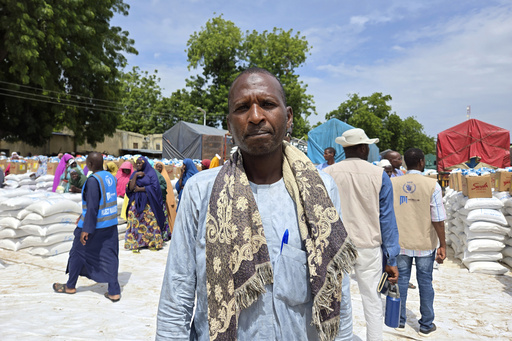
DAMASAK, Nigeria — In response to the Boko Haram insurgency that erupted in northeastern Nigeria in 2010, Abdulhameed Salisu fled his native Damasak, located in the war-torn Borno state. Now 45 and a father of seven, he returned with his family earlier this year. They are part of a larger group of Nigerians recently relocated from displacement camps back to their original villages, hometowns, or newly established communities referred to as “host communities.” This resettlement initiative is reportedly being expedited to convey the message that the conflict with Boko Haram is nearing its end.
Throughout Borno state, numerous displacement camps have been closed by authorities who assert that the locations from which these individuals fled have become safe. However, many evacuees express fears about returning, citing safety concerns. Boko Haram, the violent radical group emerging from Nigeria, began its armed struggle against Western education in 2009, seeking to impose a strict interpretation of Islamic law. This conflict, which stands as Africa’s longest ongoing militant struggle, has extended into neighboring countries.
The United Nations reports that around 35,000 civilians have lost their lives, while more than 2 million have been displaced due to the violence in northeastern Nigeria. The emblematic 2014 kidnapping of 276 schoolgirls in Chibok garnered global outrage, highlighting the severity of the crisis centered in Borno state. Currently, nearly 900,000 internally displaced people reside in various camps across Borno, with many having sought refuge in local communities. As of this year, militant assaults in the state have resulted in at least 1,600 civilian fatalities, according to data from a U.S.-based nonprofit organization.
With agriculture being the primary livelihood for approximately 70% of the population in Borno, a significant number of farmers have been either killed or abducted by militants while tending to their fields over the past year. In May, hundreds of women and children who had been held captive by Boko Haram in a forest were liberated, suggesting glimmers of hope amidst the turmoil. Yet, in September, at least 100 individuals were reportedly killed in an attack by suspected militants in the Tarmuwa area of Yobe state, located west of Borno.
Experts warn that a forced return of displaced persons might pose further risks to their safety, as security remains insufficient within the devastated region. Salisu reflects on his situation in Damasak, a garrison town with approximately 200,000 residents near the Niger border. During his time in a resettlement camp, he has struggled to secure food, relying on aid from organizations such as the World Food Program. He expresses his frustration, saying, “We are begging the government to at least find us a means of livelihood instead of staying idle and waiting for whenever food comes.”
During a recent visit to Damasak, Cindy McCain, head of the World Food Program, assured the local population that support would continue, as she urged for increased financial aid to bolster operations. “We are going to stay here and do the very best we can to end hunger,” she affirmed, acknowledging the existing funding limitations.
Typically, the resettlement process involves military transport returning displaced individuals to their original communities. The Borno state government has asserted that returnees will receive necessary supplies to support their reintegration, aided by humanitarian organizations. The state administration argues that the camps are no longer sustainable. “What we need now is … durable solutions,” stated Borno governor Babagana Zulum during McCain’s visit.
Despite the resettlement efforts, data from December reveals that one in five displaced individuals opted to remain in Maiduguri, the capital of Borno state, and surrounding towns, yet lacked any support for local integration. Many others have fled into neighboring nations, leading to the registration of over 52,000 refugees in Niger, Chad, and Cameroon since January 2023, nearly doubling the figures from the preceding 22 months.
Rapidly closing displacement camps and enforcing relocation increases vulnerability to militants who remain active in these areas, pushing some individuals to negotiate with jihadists to return to farming or fishing, according to a report from the International Crisis Group. This dynamic presents the possibility for militant groups to solidify their influence in these communities, as Boko Haram continues to carry out ambushes and village raids.
Abubakar Kawu Monguno, directing the Center for Disaster Risk Management at the University of Maiduguri, advocates for an intensified military campaign to dismantle militant operations or to encourage their surrender. Following years of avoiding their farms due to incessant attacks, some farmers in Damasak have returned to cultivate their lands, using seedlings provided by the government. Salisu is among those who resumed farming.
However, a significant flood in September caused extensive damages, collapsing a key dam and inundating about 40% of Maiduguri, resulting in numerous casualties and widespread displacements. With farmlands devastated, including Salisu’s rice crop, he faces food insecurity and now seeks assistance at a distribution hub in Damasak. “Since Boko Haram started, everything else stopped here,” he laments. “There is nothing on the ground and there are no jobs.”
Maryam Abdullahi, a mother of eight, also finds herself waiting in line at the World Food Program distribution site, reliant on food aid for her family’s survival. “The donations barely last halfway through the month,” she shares, highlighting the dire state of her and her children’s well-being. The little money she earns from selling fried yams is insufficient, intensifying her desperation for stable employment to ensure her family’s safety and sustenance. “We either eat in the morning for strength for the rest of the day or … we eat only at night,” she explains.
